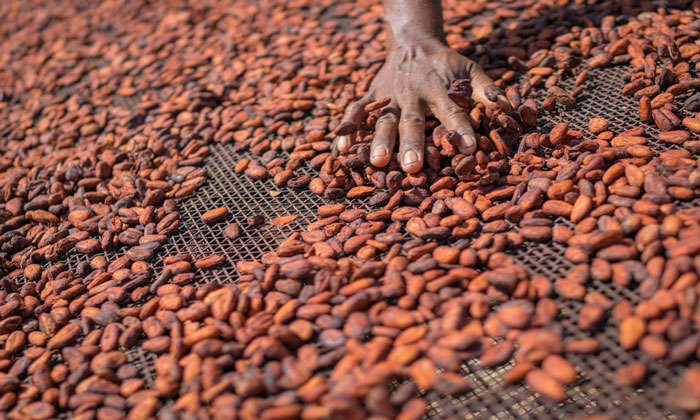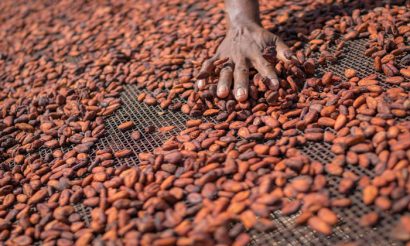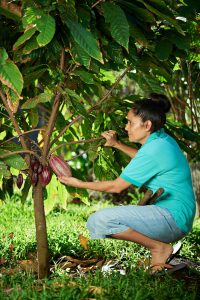Why Barry Callebaut’s model for sustainable growth is one the entire food industry should follow
- Like
- Digg
- Del
- Tumblr
- VKontakte
- Buffer
- Love This
- Odnoklassniki
- Meneame
- Blogger
- Amazon
- Yahoo Mail
- Gmail
- AOL
- Newsvine
- HackerNews
- Evernote
- MySpace
- Mail.ru
- Viadeo
- Line
- Comments
- Yummly
- SMS
- Viber
- Telegram
- Subscribe
- Skype
- Facebook Messenger
- Kakao
- LiveJournal
- Yammer
- Edgar
- Fintel
- Mix
- Instapaper
- Copy Link
Posted: 6 February 2017 | Roy Manuell | Digital Editor | No comments yet
The cocoa manufacturer is providing the entire food and beverage sector with a model for sustainable and responsible growth…


Barry Callebaut, a company explicitly committed to sustainable cocoa production “to help ensure future supplies of cocoa and improve farmer livelihoods” takes the notion of sustainability very seriously.


Following a conversation New Food had with Barry Callebaut at ISM/ProSweets in Cologne, earlier in February, we bring you a two-part special on why the Swiss-based cocoa manufacturer is providing not only the confectionery industry, but the entire food and beverage sector with a model for sustainable and responsible growth.
‘Forever Chocolate’
Barry Callebaut’s poetic new slogan for an ambitious set of self-assigned objectives to achieve by 2025, is based around four main principles:
- The eradication of child labour from the supply chain
- The lifting of more than 500,000 cocoa farmers out of poverty
- Becoming carbon and forest positive
- The use of 100% sustainable ingredients in all products
So what exactly does all this mean, and precisely how will these targets be achieved? New Food speaks exclusively to Peter Boone, Chief Innovation & Quality Officer at Barry Callebaut.
“As the global leader in high quality cocoa, this comes with great responsibility,” Mr Boone begins perhaps paraphrasing Uncle Ben from the Spiderman franchise. What the company might have in common with the comic book superhero is that with its influence and capabilities in developing nations, Barry Callebaut very much has the potential to shape policy and help many in need of aid – in this case, cocoa producers and farmers. Perhaps the comparison isn’t too romanticised after all.


The responsibility the company has is vast and two-fold, says Mr Boone.
“While we must above all champion market development and innovation, our sourcing must remain responsible and sustainable.”
A rich history
“We have been working with our farmers for decades and so this journey has been going on for years. An emphasis on social responsibility is extremely important to us, training 100,000 farmers a year and working to build and develop schools in villages – essentially we value our close relationship to those who physically produce our cocoa.”
“But we thought: It’s great having all of these wonderful stories, but it’s time to set out some clear objectives and goals to solidify progress on these issues.
“This is why we came up with the four objectives under the umbrella of our ‘Forever Chocolate’ scheme.
“We realised that there needed to be an internally-set competitive list of goals in order to catalyse and drive creativity and innovation within Barry Callebaut.
“It is certainly our hope that this ambition and vision will spill out across both our competition in the market and ultimately our partners.”
It is clear that Barry Callebaut is set on ensuring that sustainability is not something to boast about, but becomes as put by Mr Boone “the norm.”
The principles are simple in their essence. They aim to “tackle the big issues head-on” and all nicely inter-weave in terms of their inter-dependence.
“They are the hot potatoes we face as we say in Dutch,” Peter Boone continues.
The aim to eradicate child labour is noble but admittedly, he says, highly ambitious.
“In order to achieve this, we must satisfy the second of our four goals which is to lift half a million farmers out of poverty. These farmers don’t take pleasure in employing children – far from it. It is currently a necessity however that they employ child labourers. Barry Callebaut aims to double their income so that any dependence on child labour is no longer necessary.”
Doubling anyone’s wages immediately harks to the idealistic and utopian. Is this really possible? It all comes down to the improvement of productivity, education on best fertiliser practice for example suggests Mr Boone.
“It’s very important that we look together at ‘Forever Chocolate’ as a movement…”
“We need to grant farmer’s autonomy and investment but crucially ensure that they know how best to use both.”
What is Barry Callebaut most worried about regarding the four objectives?
“Not out of a lack of intent or initiative but rather because it is such a problem in particularly West Africa, we are most troubled by alleviating and ultimately eradicating child labour. Mainly from a human rights perspective it must be done but there are serious difficulties in achieving this in places such as Cote d’Ivoire and Ghana, amongst others.
“School and education is fundamental. We need to collectedly break this vicious circle.
“It is more getting the system intervention at village level that will enable us to deliver on these commitments – I’ve given myself 2-3 years.
“At present, in order to tackle the second objective, we need to train a lot of farmers – how to use fertilisers for example. Furthermore, the average tree age is over thirty years which means that productivity will inevitably go down in future, so we must therefore drive new forms of productivity and tackle plant disease by replanting farms and trees in these affected and afflicted nations.


“I am confident we can subsequently double productivity, but it will be tough”.
So what is the government’s role in all this?
“As we already know what we must do and have the models in place and we are now working with governments to ensure this sustainable growth.
“It’s very important that we look together at ‘Forever Chocolate’ as a movement.
“Confectionery seems to now have an existential crisis on its hands…”
“Ultimately, the government must drive the process, but it is imperative that we sit together and progress as a collective. From a legislative perspective, governments must take the lead but companies such as Barry Callebaut can help shape sustainable and responsible policies.
“I believable we have a responsibility to train our own associated farmers. If farmers are not paid well enough they will relocate to the city.”
(This is a phenomenon we are currently exploring in our ‘Feeding Asia’ series that explores the impact of demographic change on food security).
Feel-good factor
And so how are the objectives (announced in November 2016) affecting Barry Callebaut internally?
“There is definitely a feel-good factor around the company. We all feel we are moving forward as a unit. We have a definitive cause.
“It is not just having a benefit from a moral standpoint however. It is also highly important from a commercial perspective.
“Our partners – the Hershey’s of the world – also need to be regarded as ethically sound and demand from us that we clean up the supply chain process.
“‘Forever Chocolate’ is not just about improving productivity and helping local farmers (though this was the motivation behind it), the project also fits in with our business model.
So aside from sustainable growth, what is the other big challenge facing the confectionery sector?
“If we follow the market from a numerical perspective, it is flat in terms of volume.
The definitive concern for sugar intake and health consciousness has hit the sector hard and it has been perhaps a little slow to adapt.
“It is a wider economic trend,” Mr Boone reflects and confectionery seems to now have an existential crisis on its hands as an industry naturally dominated by sugar content.
“We must all find a way back into growth…”
And how can you achieve this do you think?
“By keeping products exciting you can always bring growth back. Innovation, storytelling and sustainability enables the consumer to feel good about what they eat.
“Our passion and energy for chocolate is reflected in our products we feel. Innovation is key and we must find exciting new ways to present cocoa products.
“Furthermore, our gourmet range is very successful perhaps due to the maintenance of a strong relationship with chocolatiers.”
“There is still a lot of space to grow and as a company Barry Callebaut goes after every growth opportunity there is.”
Following New Food’s chat with Mr Boone, we were granted a virtual reality 360 degree tour of a school and farm in Cote d’Ivoire seeing the empirical reality of what Barry Callebaut are doing.
“Innovation, storytelling and sustainability enables the consumer to feel good about what they eat…”
With sustainable development ever-higher on the agenda in each and every sector, it is hard to argue that the highly ambitious objectives set by the Swiss-based company creates a model for not just the food industry but the private sector as a whole to follow.
Look out for the second part in our series that will focus upon Barry Callebaut’s innovation and how they are keeping ahead of the game and ensuring that their chocolate remains exciting in a difficult period for confectionery.







